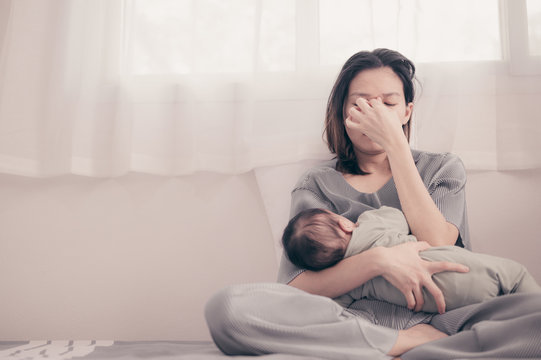A baby’s arrival can kick off major life changes. It can bring joy and celebration, but it can also be emotionally challenging for parents. Postpartum depression and postpartum blues, or “baby blues,” can occur following pregnancy.1,2 These mental health illnesses are common. More than half of women will experience baby blues in the few weeks following the birth of their baby.1 Thirteen to nineteen percent of women will experience postpartum depression.2
What are “Baby Blues”?
Baby blues are a dip in one’s mood. Sadness, exhaustion, loss of appetite, irritability, decreased sleep, and anxiety are common.1 These symptoms present within a few days following birth and fade on their own in two weeks.
Why do baby blues occur? The exact cause is unknown, but it may have to do with hormonal changes following the birth of the baby.1 A variety of risk factors may also increase the likelihood of baby blues:
- A history of mood changes during menstruation
- A prior diagnosis of depression
- A family history of postpartum depression
What is Postpartum Depression?
Postpartum depression is moderate to severe depression that occurs after birth.2 Symptoms begin in the first months after birth and can last up to a year. Postpartum depression is one of the most common conditions to impact new moms. But, only fifteen percent seek care.2 This is why it is important to know the symptoms and risk factors for postpartum depression.
Common symptoms include intense sadness, decreased joy or pleasure, and lack of energy. In severe cases, thoughts of suicide may be present. Two of the greatest risk factors for postpartum depression are a history of depression and a history of abuse.2 Baby blues can increase the risk of developing postpartum depression as well.1
Why is Postpartum Depression & Baby Blues Care Important?
If left untreated, postpartum depression can have lasting effects on the parent and baby.2 Postpartum depression can lead to poor attachment between mom and baby. This has been linked to the development of sleep disorders, as well as eating and behavior difficulties in children.2 They were also more likely to develop depression and experience developmental delays. Additionally, they were at increased risk for poor health later in life.2
Where to Begin
It can be isolating to deal with baby blues or postpartum depression, especially when adjusting to life with a new baby. Talking with a trusted provider is a helpful place to start. Orbit can provide lifestyle coaching to help with postpartum depression and guide you in the right direction.
References
- Balaram, K. & Marwaha, R. (2023). Postpartum blues. StatPearls Publishing. https://www.ncbi.nlm.nih.gov/books/NBK554546/
- Hutchens, B.F. and Kearney, J. (2020). Risk factors for postpartum depression: An umbrella review. Journal of Midwifery & Women’s Health, 65 (96-108). https://doi.org/10.1111/jmwh.13067
